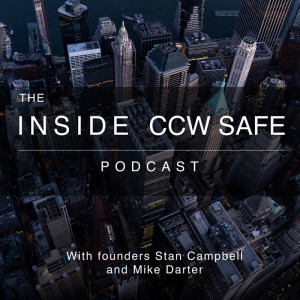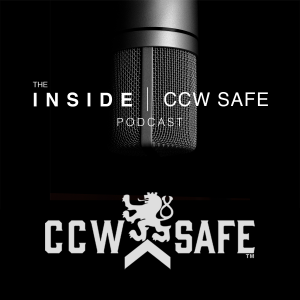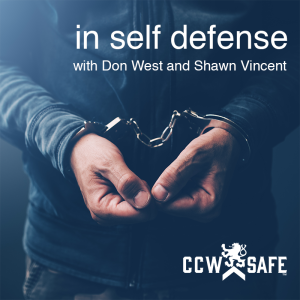Episodes

Wednesday Dec 05, 2018
Inside CCW Safe Podcast- Episode 14: Holiday Tips
Wednesday Dec 05, 2018
Wednesday Dec 05, 2018

This week, Stan and Mike talk about some common sense Holiday Tips for concealed carriers.
Some of the things that they covered are:
HOME FOR THE HOLIDAYS
Pay attention to the details of your house and surroundings. Trimmed landscaping and good exterior lighting during the long winter nights will make your home less appealing to someone looking to break in. Do a quick check on your doors and windows and make sure that they are all locked and working properly. Make sure ladders and tools are not left outside accessible to others. Set your alarm, and if you don’t have one, get one. If you can’t get one, interior lights on timers, and having someone check your mail and paper may help if you are going to be away for the holidays.
CARRY CONSISTENTLY
If you carry concealed, one of the most common mistakes is carrying when you “think you might need it”. But, there is no predicting where or when something bad is going to happen, so always be prepared.
BE CONSISTENT WITH TYPE OF CARRY
If you carry on your hip, or at 4, or appendix, then be consistent with it. It’s ok to sometimes modify due to clothing or circumstances, but when you need it, you don’t want to make a mistake on going to draw and it not being there.
PRACTICE YOUR DRAW
Practice your draw, especially if you have a new holster, or change to a different kind or level of retention holster. Make sure that your gun is unloaded and practice often. Also, practice with winter clothing, and make sure you can get a good draw if wearing bulky sweaters and coats. You have to clear the layers of clothing that is concealing your firearm to get the draw.
KEEP YOUR GUN HAND FREE
Especially during this time of year, keep your gun hand free. You’re trying to make it to the car while carrying 4 sacks, 2 boxes, attempting to locate your keys, and answer the phone, all at the same time. Find your keys before you leave the store and make sure that you keep your gun hand free and eyes and ears attentive to your surroundings.
SITUATIONAL AWARENESS
When you are stopping in traffic, pulling into a convenience store, pumping gas, walking into a grocery store, continually scan around you. Try to make it a habit to keep distance in between you and other cars while stopped in traffic and visually scan around you. While pulling into a parking lot, scan the parking lot for any potential problems or dangers, and park where you have easy access to leave if needed. The same thing applies when walking into a grocery or convenience store, or any place with lots of people. There’s not danger lurking around every corner, but doing a quick scan may keep you safe if there is something potentially dangerous there. Mobile Phones are a big distraction, so keep your heads up, not buried in a phone while shopping.
VISUALIZE SCENARIOS
Take your situational awareness a step further. Visualization is a key component for police officers dealing with potentially dangerous calls daily. If you pull into a convenience store parking lot and think to scan the lot and assess the people and inside the store, take a quick second and visualize what you would do if there was a threat inside, or as you exited your car. When visualizing scenarios, always win. Your mind will try to make complex, sometimes no win situations. Rewind it and think it through.
SIT FACING THE DOOR
This is an easy one. When you go out to eat, always sit where you can see the front door. While you’re waiting on your food, you can perform a couple quick visualization/mental scenario techniques as well.
LOCATION, LOCATION, LOCATION
Try to make it a habit of naming your location while you are driving. At corners look at the street signs and try to know where you are at all times. If something serious does happen, you need to know where you are, and how to articulate it so you can get help on the way. Whether it is a car wreck, or a carjacking, trying to explain your location by landmarks can be tough.
KEEP UP TO DATE
If you are going to be traveling armed this holiday season, keep up to date with the laws wherever you are. One great app for that is Legal Heat. Legal Heat will check for the most up to date laws when checking states, and can keep you from spending your Christmas Eve in County lock up. Also, check out the apps available in your area to keep up to date with any news pertaining to your safety or the safety of your family. Another great app we recommend is the Crime and Place app. This app can give you the crime rates in various forms, including a map format, and you can even get notifications while driving on person and property crimes around you.
Thanks again to Clif Beasley, and all the others who have written in about the podcast! If you have a comment, story, or just want to be mentioned on the show, send in an email with the subject line PODCAST INFO to support@ccwsafe.com
Be safe out there!

Wednesday Nov 28, 2018
Wednesday Nov 28, 2018
We have decided to move the podcast to Wednesdays, and will begin that schedule with this podcast on the citizen's use of force continuum. In this episode, Mike and Stan talk about the third part of the three part series.
They talk about the final two steps of the continuum, Action and Deadly Force.
The action is broken down into three components, communication, de-escalation, and lastly physical force. The two talk about each component, and then talk about the last step, being deadly force.
Again, each level should fall back on avoidance if at all possible, but the two also agree that you have to protect yourself and your family. The two also talk about the articulation that will be needed if you do have to use force, and some things to think about individually.
Time: 55:11

Sunday Nov 18, 2018
The Inside CCW Safe Podcast: Episode 12- "The Hammer" with Steve Moses
Sunday Nov 18, 2018
Sunday Nov 18, 2018

In this podcast, Stan and Mike talk with Steve Moses, who is the newest author for CCW Safe.
Steve is a long-time defensive weapons and instructor based out of Texas who has trained hundreds of men and women of all ages for more than two decades on how to better prepare to defend themselves and their loved ones. Steve has completed over 80 private-sector and law enforcement-only defensive weapons and tactics classes, and has trained civilian and law-enforcement officers in six states. Moses is a reserve deputy, former member of a multi-precinct Special Response Team, competitive shooter, and martial artist. Steve has written numerous articles for SWAT Magazine and other publications. Steve is a licensed Texas Level 4 Personal Security Officer and Instructor who was Shift Lead on a mega-church security detail for seven years, and has provided close protection for several former foreign Heads of State. He is currently an instructor at Relson Gracie Jiu Jitsu/Krav Maga in Tyler, Texas and Director of Training for Palisade Training Group (www.ptgtrainingllc.com).
This is a follow up to the article series on the Core Elements of Deadly Force.

Saturday Nov 10, 2018
Inside CCW Safe Podcast- Episode 11: Citizen's Use of Force Continuum Pt. II
Saturday Nov 10, 2018
Saturday Nov 10, 2018

This week Mike and Stan are in New York and they continue the discussion about the citizen's use of force continuum. This week they talk about the 2 levels of threat assessment and calling for assistance.
Stan and Mike both have examples from members where the member has used various techniques to avoid deadly encounters, and followed the use of force continuum.
Most of the conversation is spent on threat assessment, and they talk about determining if a threat is valid, which would be intent, if the attacker has the ability to attack, and also if the attacker has the opportunity to attack. If those three core elements are met, then most self defense actions will be seen as justified. If not, then you could easily find yourself in jail and charged with a serious crime.
Next week they will continue with the final two levels of the continuum, physical action and deadly force.
Remember, you should always attempt to fall back on avoidance if possible, and avoid any deadly encounter.
Stay safe out there, and have a great weekend!

Saturday Nov 03, 2018
Inside CCW Safe - Episode 10: Citizen's Use of Force Continuum Part I
Saturday Nov 03, 2018
Saturday Nov 03, 2018

In this week's episode, Mike and Stan talk about the Citizen's Use of Force Continuum that was developed by CCW Safe.
They talk about the foundation of the continuum being preparation and avoidance.
Preparing and avoiding is something that we do everyday, but probably don't even think about it. We wake up in the morning and most of us check the weather for any warnings, including heat waves, tornadoes, flash flooding, etc. We grab a cup of coffee and before heading into work, we check the latest traffic reports to avoid traffic jams or accidents that may set us back. We strive to make our days as efficient as possible, and we try to avoid delays and potentially dangerous situations.
When it comes to self defense and personal protection, it should be no different. We should recognize and accept the responsibility that comes with carrying, and we should always have a good understanding of risk, and where there is a higher risk in terms of our personal protection.
Location is a great example of this. I’m sure we all know of areas where we wouldn’t want to be stranded late at night, or where we wouldn’t want to take our kids anytime of day. But there are probably more locations, that we might not give much thought to, that could have elevated risks in terms of personal safety. If you are new to an area, have relocated, or are just unfamiliar with some of the surrounding areas where you live, most cities now have crime mapping available online. Even though I am not from Chicago, and live nowhere near there, I love this site that breaks down virtually every violent crime related issue in Chicago. If you can’t find anything online where you live, you can always call the non emergency line of your police department, and ask for a PIO (public information officer) or for someone who might have some information on crime in your area.
They also talk about the first layer of the continuum pyramid, being Situational Awareness. Situational awareness is the first level in the civilian use of force continuum. From an early age, we all learn things to look out for. Situational awareness is also based on your personal experiences, knowledge, or from information from others. It is the most important part of the continuum, because every action will be based off of your situational awareness.
Situational awareness is not only just your ability to notice things that are out of place, or potentially dangerous, but also your ability to quickly make complex decisions, based on the information you have at that time.
For more information, check out the earlier articles on the continuum, which covers Preparation and Avoidance and Situational Awareness.


Saturday Oct 27, 2018
Inside CCW Safe Podcast- Episode 9: Myth Busters
Saturday Oct 27, 2018
Saturday Oct 27, 2018
In this week's podcast, Mike and Stan talk about some of the myths that we get from callers and new members.
Below is a list of the top 12 myths about our service. Stan and Mike talk about each one of these in detail in this podcast.
CCW Safe is a reimbursement plan...Wrong!
CCW Safe has a cap on their plans and what they say is too good to be true…Wrong!
CCW Safe does not connect you to an attorney when you call their emergency line; you have to leave a message and then they call you back…Wrong!
CCW Safe Will not let you choose your own lawyers…Wrong!
CCW Safe does not pay 100% up front defense funds…Wrong!
CCW Safe does not provide training to its members…Wrong!
and more...

Saturday Oct 20, 2018
Inside CCW Safe Podcast- Episode 8: Interview with Bob O'Connord
Saturday Oct 20, 2018
Saturday Oct 20, 2018
In this podcast episode, Stan and Mike interview Bob O'Connor, investigator for the Florida State Attorney's Office.
Bob is a highly experienced criminal investigator, and has had the opportunity to be involved at both the investigator and major case supervisory/management roles in multiple high profile, media-intensive investigations over his career. Those cases and the various assignments over a 40 year career provided Bob with a unique perspective of the criminal justice system and the interaction between the police and the public. He has worked at the local, county, state and federal levels successfully, using multiagency cooperation as the basis for mutual accomplishments.
Time: 1:10:57

Friday Oct 19, 2018
In Self Defense- Speical Edition: Stephen Maddox story
Friday Oct 19, 2018
Friday Oct 19, 2018

In this special edition of "In Self Defense", Don West and Shawn Vincent follow up on the Stephen Maddox case. In this episode, the two hosts interview Stephen Maddox, CCW Safe member and Mike Darter, Co-Founder and CEO of CCW Safe.
This is the first case in the industry that involved a full trial of a self defense case being charged with first degree murder. CCW Safe defended Stephen in that trial, and ended up paying over $350k in the case. Stephen was found not guilty after a deliberation that lasted just over one hour.
In this podcast, they talk with Stephen and give an indepth interview of the incident through the veridct of not guilty.

Sunday Oct 14, 2018
Inside CCW Safe Podcast- Episode 7: Interview with Don West
Sunday Oct 14, 2018
Sunday Oct 14, 2018

In this episode, Stan and Mike interview Don West, National Trial Counsel for CCW Safe. They talk about an in depth history of Don's legal defense career, and talk about his role with CCW Safe. Runtime 1:04:57.

Saturday Oct 06, 2018
Inside CCW Safe- Episode 6: Core Values Part 2
Saturday Oct 06, 2018
Saturday Oct 06, 2018

In this episode, Stan and Mike finish the discussion about the core values of CCW Safe. They final two core values in this discussion are Experience and Leadership. They talk about the experience and leadership of the founders of CCW Safe, as well as the employees of CCW Safe, but more importantly the attorneys, the panel advisors of CCW Safe and others that CCW Safe has aligned themselves wtih.
Time: 56 minutes.

